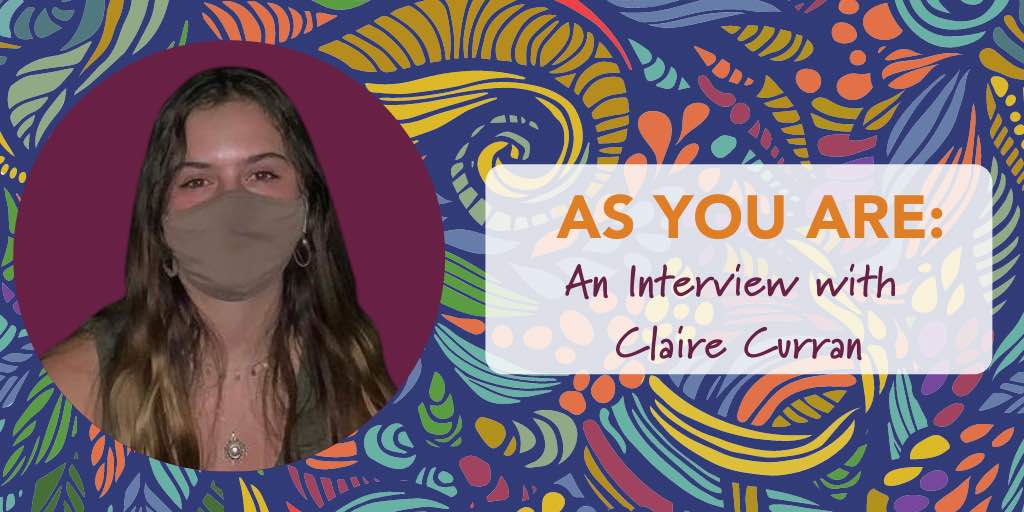Looking back on 2021, Joseph Maley Foundation saw a great deal of change, and one especially exciting change was the addition of our newest educational offering: As You Are. As You Are focuses on gender and family diversity, with an intentional goal of ensuring that all youth feel a sense of belonging in their community, where they can be accepted and respected for who they are.
For this week’s blog, we’re highlighting a speaker for the program, Claire Curran (They/She). Though Claire does an excellent job articulating their story in our speaker video, we wanted to explore Claire’s thoughts and experiences a bit deeper to show the impact and resonance of the As You Are program, and why it is so important to our mission at Joseph Maley Foundation.
Can you tell us a little bit about yourself? Your age, grade/school, hobbies/interests, etc.
Hi, my name is Claire Curran. I am sixteen years old and a sophomore at Brebeuf Jesuit Preparatory School. At Brebeuf, I am a Vice President of our GSA, and a varsity member of the speech and debate team. I also enjoy participating in theater, Brebeuf’s young democrats, and climate action in Indiana through our school’s conservation club. As well as Confront the Climate Crisis – a student run grassroots organization – fighting for climate justice in Indiana.
You’re a speaker for Joseph Maley Foundation’s newest educational program, As You Are, which focuses on gender and family diversity. How did you come to find out about the Foundation and what compelled you to speak for us?
I found out about the As You Are program from my previous seventh-grade history teacher, Erica Christie (Joseph Maley Foundation’s current Director of Education). She reached out to me about participating. It was a project I was passionate about and felt would make real change in Indiana.
Why is sharing your story so important to YOU?
Sharing my story was so important to me because when we introduce kids, especially pre-teens, to people “like them” when talking about minority issues, it allows them to relate in some ways to the person speaking, even if they are not a member of that minority group themselves. Allowing kids full access to educational platforms focused on diversity and inclusion that they can understand, and will want to listen to, is crucial to creating a kinder world.
What would it have meant to you if there was a program like As You Are when you were growing up?
It would have meant the world to me to have had something like the As You Are program when I was in elementary and middle school. I definitely had a lot of privilege in my experience of finding and figuring myself out in relation to my queer identity because I went to a school that valued all types of gender and sexuality expression. I had teachers who were gay. In fact, the first gay person I ever remember meeting was a married gay woman with a child. Seeing that sort of stability – the kind that media often tells us, as gay people, we will never experience – definitely made an impact on my willingness to express myself. It made me comfortable in knowing that I can live a long, happy life as a queer person.
Why is representation so important for our youth?
I think programs like this and conversations around representation are so important to have specifically with youth, because hatred and bigotry are like a fire. They just get bigger and bigger with the more fuel we give them, but like any fire, someone has to start it first.
Someone has to put those ideas of hate into a child’s head because no child is born believing in ideas of bigotry – whether that is racism, homophobia, misogyny, etc.. Sharing ideas of equality, love, and kindness with children, instead of bigotry and hate, makes it so we never have to stop the big forest fire, because the fire never started in the first place.
Building on that – What do you think the program can change about the way we understand and accept people of all backgrounds, genders, abilities, and about diversity in general?
I think this program will affect the way in which we interact with people of all sexualities and genders, and more importantly, the way in which we interact with these conversations in schools. One of the most amazing things that I think this program does is starting it’s educational process young. When we start conversations young, we have the ability to carry them through as everyday conversations rather than that one rare speaker that comes in every three years. Also, when we have that, we are able to create more robust conversations because we have a continued line of education on the subject that evolves with each grade level, and the previous knowledge gained from the program.
If there’s one thing you want students to take away from your story, what would it be?
One thing that I want students to take away from my story is that for students that may one day come out as queer, or any member of the LGBTQIA+ community, is that there is a community that accepts them, a life ahead of them, and so many people they’re going to meet that are just going to affirm them and make their life a better place. And you’ll meet a lot of those people because of your gender identity or sexuality.
For other students, I hope that they gain a sense of understanding and respect for the way in which they talk about those in the LGBTQIA+ community. And that they keep in mind that oftentimes their own classmates could be a part of that community.
*Please note the interview has been edited for clarity and length only.
Blog written and subject interviewed by Communications Associate, Lauren Maley
